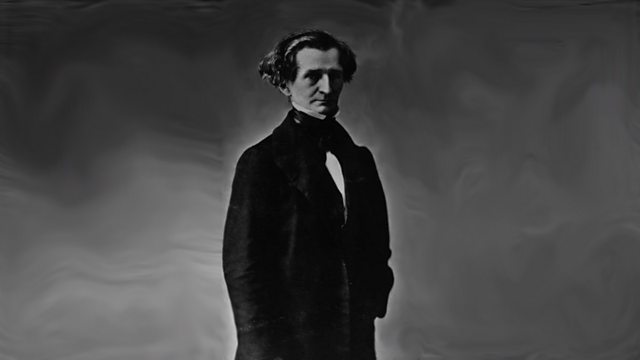
Berlioz on Berlioz
Donald Macleod explores the life and music of Hector Berlioz. Today, Berlioz as revealed through his engaging, passionate and entertaining Memoirs.
Donald Macleod explores the life and music of Hector Berlioz. Today, Berlioz as revealed through his engaging, passionate and entertaining Memoirs.
Berlioz is perhaps unique among composers in having had a literary gift almost the equal of his musical one. He earned his bread-and-butter living as a writer, turning out witty and often acerbic music criticism for the influential Journal des débats and Gazette musicale among others. His Grand Traité d’Instrumentation et d’Orchestration Modernes – a technical study of musical instruments and their role within the orchestra – was a go-to work for generations of later composers. A prolific letter-writer, his recently published Correspondance générale runs to seven fat volumes. He wrote his own first-rate librettos for the operas Les Troyens and Béatrice et Bénédict, based on Virgil and Shakespeare respectively. And in his Mémoires, begun in March 1848 in lodgings in London’s Harley Street, he produced one of the great autobiographies – a unique insight into the life and times of one of the most original musical minds of the 19th century, as well as a fascinating account of the trials, tribulations, triumphs and disasters, both professional and personal, that shaped his rollercoaster career. Hovering over the book like a guiding spirit is the figure of Estelle Duboeuf, the childhood crush Berlioz sought out again towards the end of his life. By then a widow with six children, how taken aback must she have been to be told by the now-famous composer she had known as a lad of twelve that she had unwittingly been the inspiration behind all the love scenes in his music!
Les Nuits d’été, Op 7 (Villanelle)
Janet Baker, mezzo soprano
New Philharmonia Orchestra
John Barbirolli, conductor
Overture Les Francs-Juges, Op 3
Chicago Symphony Orchestra
Georg Solti, conductor
Grande Messe des Morts, Op 5 (Dies irae)
Chetham's School of Music Symphonic Brass Ensemble
Gabrieli Consort
Ensemble Wrocław
Wrocław Philharmonic Choir and Orchestra
Paul McCreesh, conductor
La Damnation de Faust, Op 24 (Part 1, Scene 3: March hongroise)
London Symphony Orchestra
Colin Davis, conductor
Béatrice et Bénédict (Act 1, “Vous soupirez, madame?”)
Catherine Robbin, mezzo soprano (Ursule)
Syvlia McNair, soprano (Héro)
Orchestre de L’Opéra de Lyon
John Nelson, conductor
Zaïde, Op 19 No 1
Brigitte Fournier, soprano
Orchestre de L'Opéra de Lyon
Sir John Eliot Gardiner
Produced by Chris Barstow for BBC Wales
Last on
More episodes
Previous
You are at the first episode
Music Played
-
![]()
Hector Berlioz
Villanelle (Les Nuits d'été, Op 7)
Singer: Janet Baker. Orchestra: Philharmonia Orchestra. Conductor: John Barbirolli.- EMI 9 03771 2.
- EMI.
- 15.
-
![]()
Hector Berlioz
Les Francs-Juges: Overture
Orchestra: Chicago Symphony Orchestra. Conductor: Georg Solti.- DECCA 483 3094.
- DECCA.
- 6.
-
![]()
Hector Berlioz
Grande Messe des Morts, Op 5: Dies irae
Ensemble: Chetham'S Symphonic Brass Ensemble. Ensemble: Gabrieli Consort. Ensemble: Ensemble Wroclaw. Choir: Chór NFM. Orchestra: Wroclaw Philharmonic Orchestra. Director: Paul McCreesh.- Signum: SIGCD280.
- Signum.
- 2.
-
![]()
Hector Berlioz
La Damnation de Faust: Part I, Scene 3 - Hungarian March
Orchestra: London Symphony Orchestra. Conductor: Colin Davis.- LSO LIVE LSO 0827.
- LSO LIVE.
- 3.
-
![]()
Hector Berlioz
Béatrice et Bénédict: Act I, 'Vous soupirez, madame'
Singer: Catherine Robbin. Singer: Sylvia McNair. Orchestra: Lyon Opera Orchestra. Conductor: John Nelson.- WARNER 2564674974.
- WARNER.
- 18.
-
![]()
Hector Berlioz
Zaïde, Op 19 No 1
Singer: Brigitte Fournier. Orchestra: Lyon Opera Orchestra. Conductor: Sir John Eliot Gardiner.- ERATO 2564694223.
- ERATO.
- 4.
Broadcast
- Mon 11 Mar 2019 12:00BBC Radio 3








